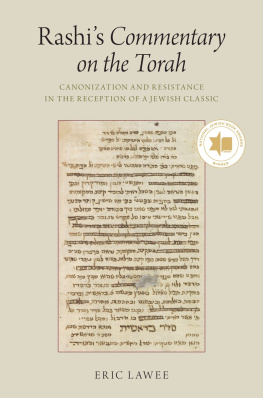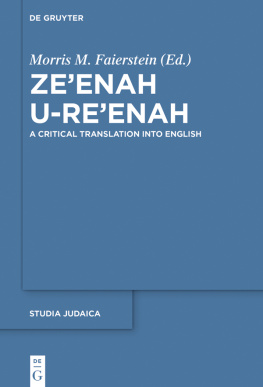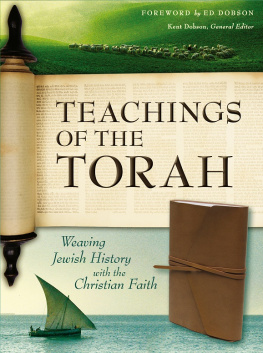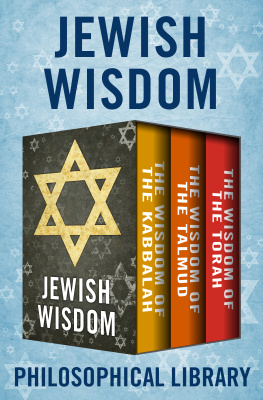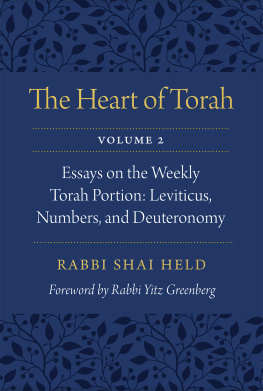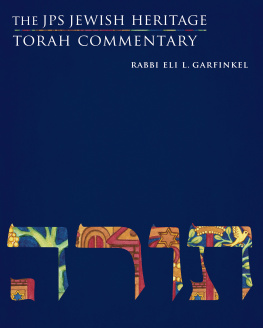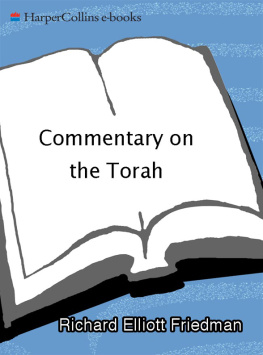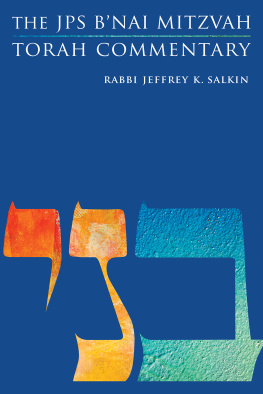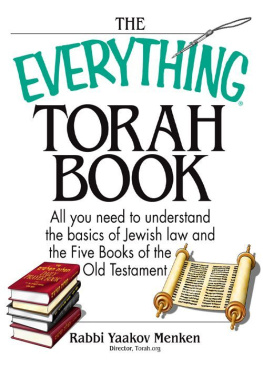Rashis Commentary on the Torah

Oxford University Press is a department of the University of Oxford. It furthers the Universitys objective of excellence in research, scholarship, and education by publishing worldwide. Oxford is a registered trade mark of Oxford University Press in the UK and certain other countries.
Published in the United States of America by Oxford University Press
198 Madison Avenue, New York, NY 10016, United States of America.
Oxford University Press 2019
All rights reserved. No part of this publication may be reproduced, stored in a retrieval system, or transmitted, in any form or by any means, without the prior permission in writing of Oxford University Press, or as expressly permitted by law, by license, or under terms agreed with the appropriate reproduction rights organization. Inquiries concerning reproduction outside the scope of the above should be sent to the Rights Department, Oxford University Press, at the address above.
You must not circulate this work in any other form and you must impose this same condition on any acquirer.
CIP data is on file at the Library of Congress
ISBN 9780190937836
eISBN 9780190937850
For Mollie
With love and gratitude
Contents
if, as francis Bacons authorial confession has it, nothing is finished till all be finished, this book would not be complete without expressions of gratitude to the following institutions, funding bodies, and people.
Beyond all else, research and writing of the book was made possible by the Israel Science Foundation (grant no. 256/14). The projects earliest stages benefited from a grant from the Social Sciences and Humanities Research Council of Canada and sabbatical research sponsored by The Lady Davis Trust at The Hebrew University in Jerusalem. Most of the sabbatical was spent in the precincts of the Shalem Center, where I received an exceedingly warm welcome from the Centers leadership and fellows. York University provided sabbatical support and gave to me many fine colleagues, especially at The Israel and Golda Koschitzky Centre for Jewish Studies. I completed the book after joining the Department of Bible at Bar-Ilan University, where I have been the recipient of generous research funding from the Asher Weiser Chair for the Study of Medieval Jewish Biblical Interpretation and, on two occasions, Keren Beit Shalom (Kyoto, Japan).
The invitation to serve as Shoshana Shier Distinguished Visiting Professor of Jewish Studies at the Centre for Jewish Studies at the University of Toronto (U of T), and extremely warm reception that I was given there, provided an ideal milieu to apply the books finishing touches. It also afforded the occasion to deliver lectures at the U of T, Columbia University, and Harvard University that yielded valuable responses leading to last-minute refinements. I owe special thanks to Ida Tugg for her extraordinary generosity during my stay in Toronto.
The book has benefited from vast stores of learning and increments of scarce time, as well as plain old encouragement, shared with me by colleagues and friends. They include Menachem Butler, Joseph Davis, Isaac Gottleib, Zeev Harvey, Menachem Kellner, Abraham Lieberman, and Moshe Rosman. Danny Lasker remains an abiding source of academic inspiration, sound advice, and friendship.
A number of people made unique contributions. Beyond all call of duty, Gad Freudenthal helped me to gain access to the manuscript of Eleazar . The immediate facilitator of that development was the wholly selfless good will of Ziva Galili. Marty Lockshin read most of the manuscript, saving me from blunders, routinely enhancing content and clarity, and providing infusions of enthusiasm when my owe store began to flag. Beyond continually urging the projects worthiness, Eddy Breuer supplied copious notes on several chapters that challenged me to rethink, clarify, and simplify. Unstinting only begins to describe the kindnesses that he and Shelley Sternberg have bestowed upon me and my family.
Two additional sources of aid deserve special mention. Angela Erisman suggested ways to turn bouts of chaos into models of clarity and stimulated countless improvements in structure and style. Doron Forte lent the book, and project of which it was born, his diverse skills as a fastidious scholar and vigilant writer. He also contributed a spirit of dedication that was ever palpable, in a way that cannot be repaid. Needless to say, no aforementioned individual or institution is responsible for deficiencies that remain.
As this study has been long in the making, I have had ample opportunity to conjure justifications for its frequent detours. Most significant was my familys return to Zion, with the upheavals and challengesbut, more important, opportunities and blessingsthat it conferred. Whatever angels (in the Maimonidean sense) brought about this life-changing move, its proximate cause (as Maimonides would say) was certainly Elie Assis, accomplished scholar and academic facilitator extraordinaire, who found a way to include me in the ranks of Bar-Ilans esteemed Department of Tanakh. I offer him my deepest thanks. Many colleagues have helped to usher me into life in my new academic home. Some are owed special debts of gratitude for coming to my aid as I sought (read: struggled) to acclimate, including Michael Avioz, Josh Berman, Ed Greenstein, Jonathan Jacobs, David Malkiel, and Yosef Ofer. Josh made the match with the superb team at Oxford University Press headed by Cynthia Read that produced the book in its polished and precise final form, with special thanks to project manager Felshiya Samuel and copyeditor Brooke Smith. I also extend profound gratitude to two then anonymous readers, Zev Harvey and Haim Kreisel, admired senior scholars from whom I have learned a great deal. Their investment of time and thought yielded suggestions that led to significant reformulations and improvements.
It is in thinking about members of my family that words begin to fail me. The distance that separates me from my father, sister, brother, and their families does not diminish the sense of closeness, a feeling that sustained me as we experienced the loss of my mother just as the books final lines were being written. I doubt my mother would have read the book; I know she would have been very proud of it, as she was of her children and grandchildren (and, late in life, new great-grandchild) and their accomplishments generally, such pride being one of her deepest pleasures. My parents benevolence in support of my at times idiosyncratic life choices has never faltered. My father continues the tradition and continues to inspire. Different sorts of sustenance have been forthcoming from Aviezer, Noam and Adeena, Gavriella, Sarah, and Talia, who provide regular doses of joy, insight, and, as time goes on, ever more impressive models that keep me humble. My spirits are always raised in the presence of the next generation, Nehemiah and Yehoshua.
As always, the abiding source of meaning in my life is Mollie, to whom I owe many debts of gratitude, not least for persevering during a semester away from home that proved pivotal in completing the book but more difficult than anticipated (and regrettably consonant with the situation described by Rashi in his closing comment on Bereshit 24:67). Her support and sustaining stewardship of our family is the main context out of which I send forth the book to its own (presumably modest) reception history. May the Source of Blessings continue to grant her, and us, enduring achievements born of a sustained focus on ultimate goals, accompanied by inner peace.

